
Guests
- Lorena GonzálezSeattle’s first Latino councilmember. Before being elected in 2015, she worked for a decade as a civil rights attorney.
President Trump said he would “show great heart” when considering whether to deport recipients of DACA, or Deferred Action for Childhood Arrivals. So why is Daniel Ramirez Medina sitting in jail? We look at the case of a 23-year-old father who was detained by ICE one week ago in Des Moines, Washington, even though he has permission to live and work in the United States under DACA. His supporters have maintained a vigil at the Northwest Detention Center in Tacoma, Washington, where he is being held. It’s a private detention center owned by the for-profit prison company GEO Group. We go to Seattle, Washington, to speak with Councilmember Lorena González, a civil rights attorney who is the city’s first Latino councilmember.
Transcript
AMY GOODMAN: This is Democracy Now!, democracynow.org, The War and Peace Report. I’m Amy Goodman. Across the country Thursday, thousands of immigrants closed their businesses, refused to go to work, kept their children home from school for a “Day Without Immigrants.” It was a protest against President Trump’s crackdown on immigrants living in the United States. The protests in San Francisco; Los Angeles; New York; Phoenix; Chicago; Philadelphia; Atlanta; Detroit; Washington, D.C.; Raleigh and Charlotte, North Carolina; Austin, Texas; and other cities came after Immigration and Custom Enforcement, or ICE, sent shock waves through immigrant communities by arresting at least 680 people in a series of raids last week.
Today, we’re going to look at two cases. One is of an immigrant mother of four who has lived here for 20 years and has now taken sanctuary in a Denver church to avoid possible deportation. The other—well, we’re going to start with Donald Trump’s press conference yesterday, because the case involves DACA.
LISA DESJARDINS: In addition, on the DACA program for immigration—
PRESIDENT DONALD TRUMP: Right.
LISA DESJARDINS: —what is your plan? Do you plan to continue that program or to end it?
PRESIDENT DONALD TRUMP: We’re going to show great heart.
AMY GOODMAN: Donald Trump saying, “We’re going to show great heart.”
So why is Daniel Ramirez Medina sitting in jail? He’s a 23-year-old father who was detained by ICE last week in Des Moines, Washington, even though he has permission to live and work in the United States under President Obama’s DACA program, or Deferred Action for Childhood Arrivals. A hearing in the case is scheduled for today. His lawyers have called his detention “unprecedented and unjustified.”
On Thursday, the Justice Department claimed in a legal briefing that Ramirez was arrested because agents suspected he might be part of a gang, based on a tattoo on his arm that reads “La Paz,” which means “Peace,” and ”BCS,” which stands for “Baja California Sur,” the Mexican state where Ramirez was born. His lawyers say Ramirez is not part of a gang.
He has been in the United States since he was seven years old, and is the immigrant father of a 3-year-old son, who is also a U.S. citizen. His supporters have maintained a vigil at the Northwest Detention Center in Tacoma, Washington, where he’s being held. It’s a private detention center owned by the for-profit prison company GEO Group.
For more, we go to Seattle, Washington, where we’re joined by Lorena González. She is Seattle’s first Latina councilmember. Before being elected in 2015, she worked for a decade as a civil rights attorney.
Welcome to Democracy Now!, Councilmember. Can you explain how Daniel Ramirez ended up in jail?
LORENA GONZÁLEZ: Well, the facts, as we know them, is that Daniel was at the home of his father just south of Seattle, and ICE showed up in the morning to pick up his dad, with a warrant. And at that time, his dad had asked for permission to go back into the house to let his son know that—what was happening. And at that time, ICE also entered back into the home with Daniel’s father and began to ask Daniel questions. And when they asked him the questions, they asked him whether he was born here and whether he was in the country legally? And based on his answers, they arrested him.
AMY GOODMAN: Is this the first time that you’ve seen this happen?
LORENA GONZÁLEZ: This is the first time, that we know of, of a DACA recipient being arrested under a Trump administration. And, you know, as far as we knew last week, and as we know now, he had his DACA permit with him, on him, when he was arrested. He repeatedly told the ICE agents that he had permission to be in the country. And nonetheless, they decided to exercise their discretion in arresting him and booking him into the Northwest Detention Center in Tacoma, where he sits now.
AMY GOODMAN: What effect has this had on DACA young people, DREAMers throughout Washington? I mean, in a moment, we’re going to go to Denver, where we speak—
LORENA GONZÁLEZ: Yeah.
AMY GOODMAN: —with a woman, an immigrant mother of four, who just took sanctuary in a Unitarian church. And she told me yesterday that it was seeing Daniel Ramirez being arrested that caused her—one of the reasons she sought refuge in the church. I mean, he is—he is allowed to be in this country and work.
LORENA GONZÁLEZ: Right. I think—I think the impact has been huge. So, Washington state has about 20,000 DACA recipient youngsters. And, you know, Seattle is home to public universities. Washington state has been very generous in terms of providing a pathway for DACA recipients to go to our public universities with financial aid. And what we are hearing and what I’m hearing is that people are genuinely concerned. If somebody who has the legal right to be in this country is arrested, what does that mean for my parents, that aren’t legally authorized to be in the country? That is a very chilling effect. And we are hearing stories of people who don’t want to go to school because they’re afraid that they’re going to be caught in a raid, you know, parents who are starting to bunker down because they are nervous that there might be some sort of enforcement action on them, with or without a warrant. These are very serious concerns.
And I think that we are all experiencing uncertainty under this particular administration. And I think now it’s time for DACA students—DACA recipients, unfortunately, to be experiencing even more uncertainty about what their future is in this country. And this administration does—they have a responsibility and an obligation to tell us, the American people, and to tell these young people, who have done everything that they were supposed to do, under Obama’s DACA program, what their future will be in this country. And we won’t stop until we get an answer to that particular question.
AMY GOODMAN: I mean, the problem for DREAMers, for young DACA folks, is that they came out of the shadows. They gave all their information over to the government, with the idea that they would be legalized, which they are for this period of time. So, what does this mean when the government, that took their information, now turns against them?
LORENA GONZÁLEZ: I think it’s problematic. And, you know, I was—before I was elected, I came up in the immigrant rights movement. We’ve been fighting for years for comprehensive immigration reform. And the best we could get under the Obama administration was relief for these DREAMers. And this is a policy that has bipartisan support, has always had bipartisan support. And we feel very strongly that we need to keep the program intact and that we need to continue to protect these DREAMers, who came here very, very young, who have contributed to society meaningfully.
And, you know, I think, at this point, when we are talking to DREAMers, we encourage them to continue to live their life in a way that will create a pathway for them to become a citizen. But there’s no question that the reason why Daniel’s case is so important is because it’s the first incident under a Trump administration in which a DREAMer has been arrested, a lawful, legal DREAMer has been arrested. And what happens today, I think, will send a signal, one way or the other, to the 750,000 DREAMers in our country as to what this president intends to do as it relates to those almost 1 million people living in this country whose future right now is uncertain, unfortunately.
AMY GOODMAN: So, are you telling people they should apply for DACA now or not, hold off?
LORENA GONZÁLEZ: Right now, all of the immigrant rights organizations are recommending that people—even if you think you qualify for DACA, that you do not qualify for DACA right now. If you are in the process of applying, the recommendation is that you continue to finish that process. But we are not encouraging additional DREAMers who have not previously applied to apply at this moment.
AMY GOODMAN: So, Chicago Congressmember Luis Gutiérrez was among a group of Latino congressmen who were barred from a meeting Thursday with a top federal immigration enforcement official. While lawmakers who did make the meeting are worrying that all undocumented people are at risk for deportation, what about this barring, and are you able to speak with local ICE to find out what their plans are?
LORENA GONZÁLEZ: I am terribly disappointed to hear that our congressional leaders were kept out of a meeting that was first set, canceled and then rescheduled without notifying the original attendees. It is just a clear sign of disrespect. It’s a clear sign of lack of transparency and an unwillingness to share information. Here in Seattle, both the mayor and I have made requests to meet with the director, the regional director here, for our ICE Seattle Field Office. And just yesterday, we received word from their spokesperson that that meeting would not be able to be accommodated. So we are experiencing here locally—where we are feeling the greatest impact of Daniel’s arrest, we’re experiencing the same type of stonewalling that is occurring in Washington, D.C., to our federal delegation. And I think it’s irresponsible.
AMY GOODMAN: What happens today in Daniel’s hearings? What are the possible outcomes as he sits in this Tacoma jail?
LORENA GONZÁLEZ: Well, I think—I think the possible outcomes is—and the best outcome is that Judge Donohue, who is the judge in the case, agrees with Daniel and his position and his lawyers, and that they order his release immediately. That’s the best-case scenario. Worst-case scenario is that the judge agrees with ICE and continues to hold Daniel, and he has to go through the removal proceedings that ultimately will result potentially in him being deported. There are some shades of gray there. The federal government is arguing that our federal district court doesn’t even have jurisdiction over this matter or this case and that it should be an immigration judge, who sits down at the Northwest Detention Center, who decides the fate of Daniel. And so, those are three different things that could come out of today, but, of course, we’re all on pins and needles here in Seattle, in Washington state, hoping for the best outcome, not just for Daniel, but, again, for the 750,000 DREAMers that live across the country.
AMY GOODMAN: Lorena González, I want to thank you for being with us. Councilmember González is the first Latino councilmember in Seattle. Before being elected in 2015, she worked for a decade as a civil rights attorney.


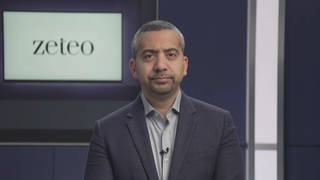
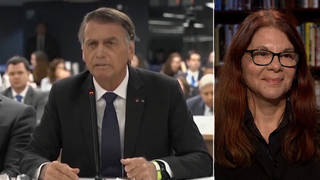
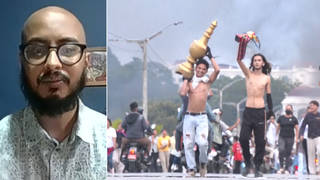





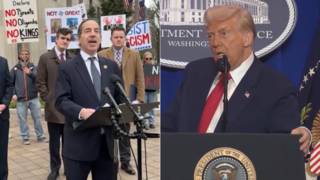
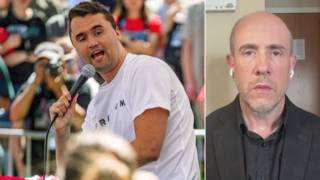
Media Options